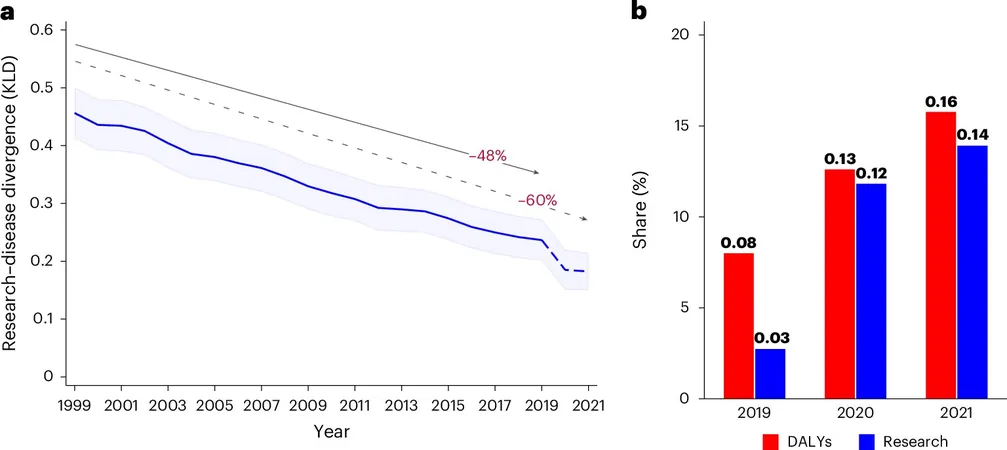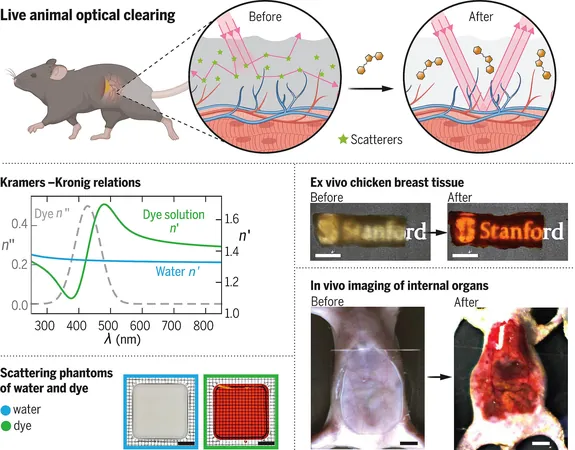
Global Health Research Faces Growing Divide: Urgent Study Reveals Alarming Trends
2025-09-02
Author: William
The Good, the Bad, and the Widening Gap in Global Health Research
In a revealing new study, researchers highlight a stark reality in global health: despite some progress, the disconnect between health research and real-world disease needs is poised to widen. While the gap has somewhat closed since 1999, primarily by chance, looming budget cuts—especially from the U.S.—threaten to reverse these gains.
Accidental Alignment: Not a Triumph But a Coincidence
The research team, led by Cassidy R. Sugimoto from Georgia Tech, unveiled these findings in *Nature Medicine*. Historically, only a mere 10% of global health research funding addresses the overwhelming diseases affecting 90% of the population. The study utilized a novel AI-driven approach, analyzing a staggering 8.6 million articles from 1999 to 2021, revealing that while the distribution of diseases has evolved, research priorities have not kept pace.
A Diminishing Focus on Communicable Diseases
As public health interventions reduce communicable disease impacts, the problems facing global populations are beginning to resemble the research that scientists are already pursuing. However, as non-communicable diseases rise, the researchers warn that disparities between research focus and actual health needs may again grow.
Why the Gap Will Widen: Localized Research Trends
The study highlights a concerning trend: the majority of chronic disease research often reflects Western-centric perspectives, overlooking the unique challenges faced in developing regions. Scientists tend to prioritize their own populations' problems, leaving vast swathes of the globe under-researched and underserved.
COVID-19: A Unique Case of Rapid Realignment
The COVID-19 pandemic showcased the global health research system's remarkable ability to pivot in times of crisis, with research on respiratory diseases skyrocketing in the wake of the outbreak. However, this responsiveness raises questions about why such urgency is not applied to other pressing health challenges.
Funding Cuts: A Dire Warning for Global Health
The study sounds an alarm about potential U.S. funding cuts for global health research initiatives, like PEPFAR and USAID. Such reductions could jeopardize nearly half the progress made in aligning research with the world’s health needs over the past two decades, particularly affecting vulnerable regions like Sub-Saharan Africa, which heavily relies on U.S. funding.
A Call to Action: Realigning Global Health Research
To ensure that health research aligns with actual health needs, the authors advocate for coordinated global efforts in three key areas: fostering sustainable governance for health funding, investing in local research capacities, and committing to open science practices. These strategies are crucial to avoid the pitfalls of ‘helicopter science’ and to build a more equitable health research landscape.









 Brasil (PT)
Brasil (PT)
 Canada (EN)
Canada (EN)
 Chile (ES)
Chile (ES)
 Česko (CS)
Česko (CS)
 대한민국 (KO)
대한민국 (KO)
 España (ES)
España (ES)
 France (FR)
France (FR)
 Hong Kong (EN)
Hong Kong (EN)
 Italia (IT)
Italia (IT)
 日本 (JA)
日本 (JA)
 Magyarország (HU)
Magyarország (HU)
 Norge (NO)
Norge (NO)
 Polska (PL)
Polska (PL)
 Schweiz (DE)
Schweiz (DE)
 Singapore (EN)
Singapore (EN)
 Sverige (SV)
Sverige (SV)
 Suomi (FI)
Suomi (FI)
 Türkiye (TR)
Türkiye (TR)
 الإمارات العربية المتحدة (AR)
الإمارات العربية المتحدة (AR)